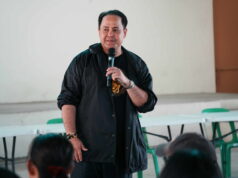CLARK FREEPORT – Seven militant group leaders have filed before the Supreme Court an 88-page petition citing dozen reasons that purportedly render as unconstitutional two laws that gave birth to the Aurora Special Economic Zone.
The petition questioned the constitutionality of Republic Act 9490 or the Aurora Special Economic Zone Authority (ASEZA) Act of 2007 and its amendatory law Republic Act 10083 or the Aurora Pacific Economic Zone and Free Port Act of 2010.
The petitioners also asked the high court to issue a temporary restraining order against projects at the economic zone which covers the entire Barangays Esteves, Dibet and Dibacong in Casiguran, Aurora which, since 2007, has received government funding of about P3 billion.
The petitioners included Anakpawis party list Rep. Rafael Mariano, Pamalakaya fisherfolk alliance chair Fernando Hicap, Resist Apeco! Defend Aurora Movement convener Salvador France, Danilo Ramos of Kilusang Magbubukid ng Pilipinas (KMP), Joseph Canlas of Alyansa ng Magbubukid sa Gitnang Luzon (AMGL), Elmer Dayson and Milo Serrano of Panlalawigang Alyansang ng Magbubukid ng Aurora (Pamana) and the Justice and Peace Action Group of Aurora (JPAG).
Their petition said “RA 9490 and RA 10083 violated the constitutional provisions pertaining to agrarian reform and social justice.”
“Agrarian reform and social justice were extremely violated by ASEZA and its amendatory law (Apeco) which patently disregarded the agrarian reform beneficiaries of the agricultural lands awarded to them by the national government when Apeco started covering lands already covered and awarded through government land reform programs,” said the petition.
It also cited “gross violation of fisherfolk rights as enshrined in the 1987 Constitution and relevant laws”, citing a provision saying “the state shall protect the rights of subsistence fishermen, especially of local communities, to the preferential use of local marine and fishing resources, both inland and offshore.”
“RA 9490 and RA 10083 make no explicit mention of fishermen but the areas these laws subject to the establishment of ecozone cover the residences of subsistence fishermen and their fishing grounds,” the petition noted.
It said that the two controversial laws allows the conversion of areas into freeport, including shorelines, bays and inland rivers of barangays Esteves, San Ildefonso, Cozo and Dibet which, however, are areas that adjoin fishing grounds of local folk.
The petitioners also noted that RA 10083 covers 11,900 hectares being claimed as ancestral lands by the Agtas and Dumagats in barangays San Ildefonso, Culat and Cozo.
The petitioners also insisted that “the people of Casiguran who are directly and unduly affected by the creation of ASEZA and Apeco were not consulted nor heard before these laws were passed by Congress.”
“The railroading of the laws creating Aseza and Apeco at the House of Representatives and the Senate therefore is another violation of their right to due process,” the petitioners maintained.
The petition also cited other features of the two laws that “glaringly conflict with other provisions of the 1987 Constitution and other national codes and laws”, as it cited the following allegations:
-The Aurora SEZ can take up land and expand itself without further legislative action;
-The APECO can likewise borrow funds from foreign sources and incur indebtedness without need of the concurrence of the Bangko Sentral ng Pilipinas;
-RA 10083 also authorizes foreign investors under the guise of private enterprises to operate public utilities;
-RA 10083 also compulsorily acquires productive lands and marine resources for an admittedly unprofitable venture from the standpoint of the majority of the Filipino People and leaves the affected communities with no means of livelihood;
-Taxpayers’ money is spent on a non-profitable venture without a clear public purpose but only for the benefit of private business, big corporations and the officers of APECO;
-RA 10083 allows an APECO board of directors that can perpetually be controlled by a single politically powerful family.
Among those named as respondents were Apeco as represented by its board composed of Roberto Mathay, President and CEO, Aurora Gov. Bella Angara-Castillo, Rep. Juan Edgardo “Sonny” Angara, Mayor Victorio Briones of Dilasag, Aurora and Harley Rose Alcantara Daquioag who supposedly represented workers in the board.



